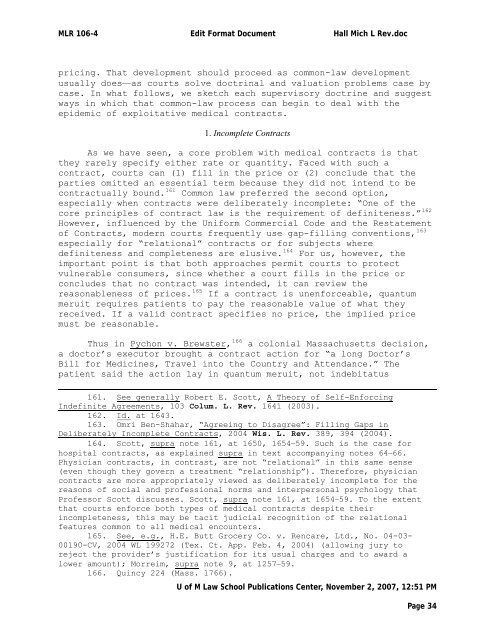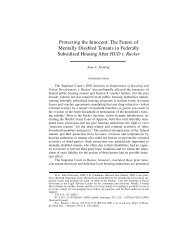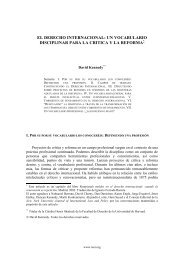Patients as Consumers - Harvard Law School
Patients as Consumers - Harvard Law School
Patients as Consumers - Harvard Law School
You also want an ePaper? Increase the reach of your titles
YUMPU automatically turns print PDFs into web optimized ePapers that Google loves.
MLR 106-4 Edit Format Document Hall Mich L Rev.doc<br />
pricing. That development should proceed <strong>as</strong> common-law development<br />
usually does—<strong>as</strong> courts solve doctrinal and valuation problems c<strong>as</strong>e by<br />
c<strong>as</strong>e. In what follows, we sketch each supervisory doctrine and suggest<br />
ways in which that common-law process can begin to deal with the<br />
epidemic of exploitative medical contracts.<br />
1. Incomplete Contracts<br />
As we have seen, a core problem with medical contracts is that<br />
they rarely specify either rate or quantity. Faced with such a<br />
contract, courts can (1) fill in the price or (2) conclude that the<br />
parties omitted an essential term because they did not intend to be<br />
contractually bound. 161 Common law preferred the second option,<br />
especially when contracts were deliberately incomplete: “One of the<br />
core principles of contract law is the requirement of definiteness.” 162<br />
However, influenced by the Uniform Commercial Code and the Restatement<br />
of Contracts, modern courts frequently use gap-filling conventions, 163<br />
especially for “relational” contracts or for subjects where<br />
definiteness and completeness are elusive. 164 For us, however, the<br />
important point is that both approaches permit courts to protect<br />
vulnerable consumers, since whether a court fills in the price or<br />
concludes that no contract w<strong>as</strong> intended, it can review the<br />
re<strong>as</strong>onableness of prices. 165 If a contract is unenforceable, quantum<br />
meruit requires patients to pay the re<strong>as</strong>onable value of what they<br />
received. If a valid contract specifies no price, the implied price<br />
must be re<strong>as</strong>onable.<br />
Thus in Pychon v. Brewster, 166 a colonial M<strong>as</strong>sachusetts decision,<br />
a doctor’s executor brought a contract action for “a long Doctor’s<br />
Bill for Medicines, Travel into the Country and Attendance.” The<br />
patient said the action lay in quantum meruit, not indebitatus<br />
161. See generally Robert E. Scott, A Theory of Self-Enforcing<br />
Indefinite Agreements, 103 Colum. L. Rev. 1641 (2003).<br />
162. Id. at 1643.<br />
163. Omri Ben-Shahar, “Agreeing to Disagree”: Filling Gaps in<br />
Deliberately Incomplete Contracts, 2004 Wis. L. Rev. 389, 394 (2004).<br />
164. Scott, supra note 161, at 1650, 1654–59. Such is the c<strong>as</strong>e for<br />
hospital contracts, <strong>as</strong> explained supra in text accompanying notes 64–66.<br />
Physician contracts, in contr<strong>as</strong>t, are not “relational” in this same sense<br />
(even though they govern a treatment “relationship”). Therefore, physician<br />
contracts are more appropriately viewed <strong>as</strong> deliberately incomplete for the<br />
re<strong>as</strong>ons of social and professional norms and interpersonal psychology that<br />
Professor Scott discusses. Scott, supra note 161, at 1654–59. To the extent<br />
that courts enforce both types of medical contracts despite their<br />
incompleteness, this may be tacit judicial recognition of the relational<br />
features common to all medical encounters.<br />
165. See, e.g., H.E. Butt Grocery Co. v. Rencare, Ltd., No. 04-03-<br />
00190-CV, 2004 WL 199272 (Tex. Ct. App. Feb. 4, 2004) (allowing jury to<br />
reject the provider’s justification for its usual charges and to award a<br />
lower amount); Morreim, supra note 9, at 1257–59.<br />
166. Quincy 224 (M<strong>as</strong>s. 1766).<br />
U of M <strong>Law</strong> <strong>School</strong> Publications Center, November 2, 2007, 12:51 PM<br />
Page 34

















